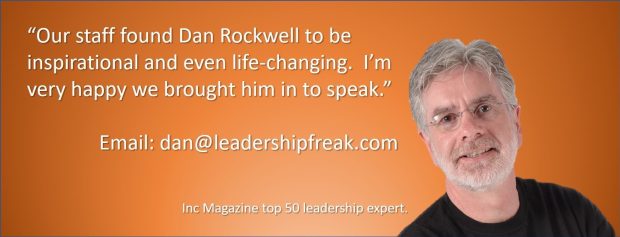7 Ways to Immediately Open Your Mind to Useful Ideas
You can’t be open to everything.
Open-minded leadership is a pernicious waste of time when you lose sight of outcomes. So how can you open your mind without wasting time on useless conversations?
7 ways to immediately open your mind to USEFUL ideas:
#1. Sniff the stink.
An open mind loves learning. You learn from mistakes and screwups. Success is confirmation. Failure is education.
#2. Question the obvious.
Just about the time you think you know something, the door to your mind slams shut.
- What’s working? Why is it working?
- What makes you say that?
- What if we’re wrong?
- What assumptions are guiding this decision?
#3. Confess mistakes.
An open-minded response to painful mistakes is the source of…
- Honest confession. “I screwed up.”
- Innovative suggestions. “What could I have done differently?”
- Humble response. “Next time, I’ll…”
- Responsibility taking. “This is what I’m doing to make things right.”
#4. Seek wisdom in the right place.
Look for wisdom from people who actually do something. What if the suits around the table are self-protective, narrow-minded, and self-serving?
The people who do stuff have useful insight when they embrace your vision.
#5. Reject butt-kissers and brown-nosers.
#6. Honor the ‘right’ people.
Honor people who energize high performance in others.
Retrain, marginalize, or remove persistent de-energizers.
#7. Choose contrarians carefully.
Welcome contrarians that see the big picture. There’s no virtue in always being against. But contrarians with vision bring value to an open mind.
3 questions to be open-minded AND on track:
Conversations need boundaries to deliver useful results.
Direction is protection for an open mind.
- How does this nudge us in the right direction?
- What will we achieve if we take this step?
- What is the goal of this suggestion?
Open-minded leaders – apart from clear direction – wallow in distraction and irrelevance.
What makes an open mind useful? Not useful?
How might leaders develop an open mind?



To be open to change and acceptance has become the vision of the future. We have choices sometimes we don’t, unless you have chosen to walk out the door and start over. For the jist of the conversation take each day as a learning experience and build on that. For many of us its the wear the hat that goes 360, thats not the job description yet we learn how to do new things and conduct Business, education or lead congregations big and small.
The Coaches who help children realize they have the ability to be something far beyond their sports the participate in, the Teachers who see the students that are left behind and offer to help them after classes are over, or help them get guidance from others to nourish their lives with opportunities and faith. We only stop learning when we chose so, anyone can teach someone something. Always be humble and kind.
Thanks Tim. Your passion comes out in your comment. One thing I took from your comment is don’t be limited by a job description.
Dan,
Yes, when I was in the union for 19 years, it was just that, “you only did what your job classification allowed”, unless no one else was available to fix the issue. I have always yearned to reach farther and learn more beyond descriptions which, was the beginning of multi-tasking and reach for the stars..
I wokemthid morning in 7:45 ET time and this brought refreshment to my mind.
Thanks
Thanks Alfred. Have a great day.
ABC——Always Be Curious
Thanks Paul. You nailed the basics. 🙂